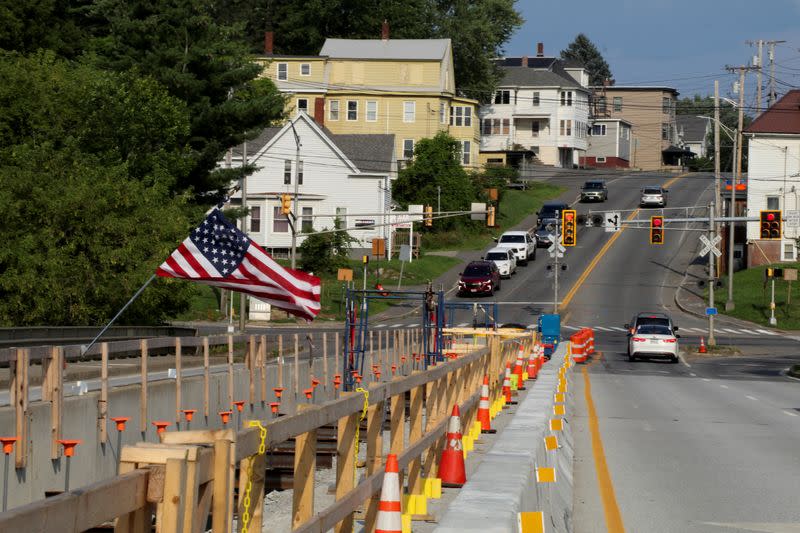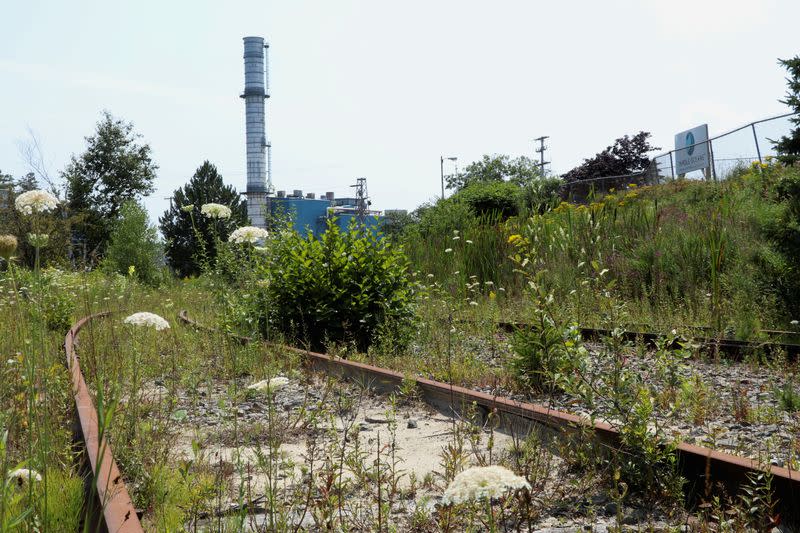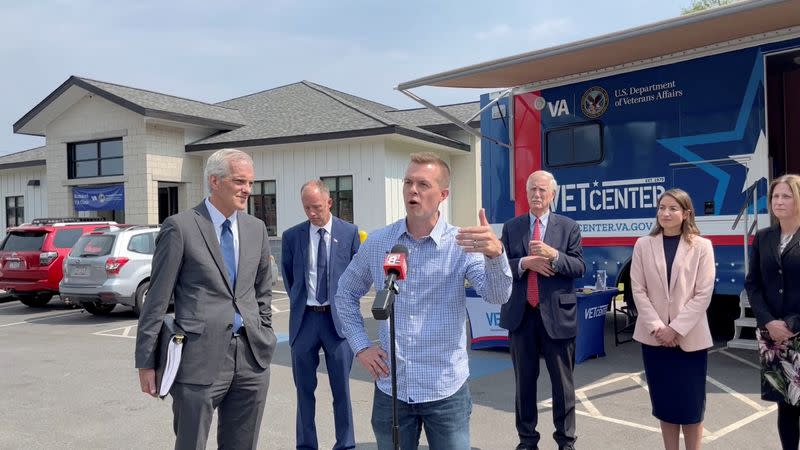Can Joe Biden and a fistful of cash win rural America for Democrats?
- Oops!Something went wrong.Please try again later.
- Oops!Something went wrong.Please try again later.
By Andrea Shalal
WASHINGTON (Reuters) - Rhiannon Hampson drives hundreds of miles across Maine's countryside each week as the U.S. Department of Agriculture's top rural development official in the state, and says she's never seen so many newly paved roads and rebuilt bridges as in the past year.
Replacement of Maine's century-old Ticonic Bridge in Waterville and upgrades to the airport in Presque Isle are among the thousands of projects nationwide funded by President Joe Biden's bipartisan $1 trillion infrastructure law.
But that fact is often lost on the people that use them, Hampson said. "We've had historic levels of funding in the last couple of years," she said, "but maybe it's just harder for us in rural spaces to see the breadth of it."
The disconnect lies at the crux of Biden's efforts to win back parts of rural America - home to one of every five Americans - that swung heavily to Donald Trump and the Republicans in the last two presidential elections.
Getting credit for economic gains is key to Biden's 2024 reelection, and nowhere is that fight harder than in rural areas of the U.S., where frustrations have grown among generally older, whiter voters after decades of industrial decline and job losses in the face of globalization and declining agriculture.
Biden's campaign plans an aggressive outreach to rural voters, who account for 30% of the electorate in swing states North Carolina, Georgia and Wisconsin, around 22% in Pennsylvania, and about 61% in Maine.
Reuters spoke to more than two dozen Democratic officials, local politicians, activists and academics who said years of neglect of rural areas, skepticism about government spending and divisions over social issues such as abortion and education mean Biden faces an uphill battle.
Trump widened his lead among rural voters to 65% in 2020 from 59% in 2016. In the 2022 midterm elections, Republican candidates got 69% of the rural vote.
Biden's problems in Maine's rural second district, which backed Barack Obama in 2008 and 2012 before embracing Trump, are a microcosm of the issue nationwide, says Mark Brewer, a political science professor at the University of Maine in Orono.
Biden won the coastal, more populated first district, taking three of the state's four electoral votes. (Maine and Nebraska are the only U.S. states that split electoral votes, the other 48 are 'winner takes all.')
Nearly all, 94%, of the nation's job growth has happened in urban counties since 2000, Suzanne Mettler, a politics and policy professor at Cornell, and Trevor Brown, a PhD student there, wrote in a 2022 study on Democrats and the rural-urban divide.
Trump and other Republican candidates have stoked the resentment felt by many rural Americans over what they see as a push by urban "elites" to enforce their views on education, guns and gender identity, Mettler and Brown wrote.
Ron Kaufman, a Republican National Committee member from Massachusetts, said rural voters are more focused on the high price of gasoline and other pocketbook issues than big government investments that might take years to boost the local economy while also adding to the national debt.
While inflation has dropped since hitting a 40-year peak of 9.1% in the summer of 2022, food costs remain high and gasoline prices are surging, which hits harder at Americans in rural areas who drive longer distances.
"They see this administration being a disaster for the American people on issues they care about like going to the pump," said Kaufman, a former adviser to Utah Senator Mitt Romney who also worked for President George H. W. Bush.
BILLIONS FOR HEALTH, ENERGY
Democratic officials said they plan to double down on their messaging in select rural areas ahead of the 2024 election, touting the billions of dollars in federal funding that have flowed to rural areas since Biden took office in infrastructure, semiconductor and inflation-focused laws.
That includes $20 billion for rural health systems, $20 billion for clean-energy agriculture projects, $11 billion for rural electrification and $13 billion towards rural clean energy projects, the White House calculates.
"We're in a moment of unprecedented opportunity for rural America, when you look at the investments that have been made," said Tom Perez, a former chair of the Democratic National Committee who took over in June as Biden's top liaison to governors, mayors and other elected officials.
Political veterans, even those who support Biden, remain skeptical.
"This administration is doing more than anyone has in a long time to help advanced farming, but I'm not sure if it will translate - at least in the short term - into changing voting patterns in rural America," said John Piotti, a Democrat and CEO of the American Farmland Trust, who served eight years in Maine's state legislature.
Even young voters - who historically support Democrats, Pew and other data show - voted for Republican candidates in rural areas in 2022 by a margin of 64% to 33%, according to the Center for Information and Research on Civic Learning and Engagement at Tufts University.
White House internal polling shows rural Americans are "overwhelmingly supportive" of some specific Biden policies, like those that expand health care and veterans benefits, said one Biden official. The Kaiser Family Foundation and Data for Progress, a progressive think tank, show these issues have bipartisan voter support.
But voters are not giving Biden credit.
A recent Reuters/Ipsos poll showed 60% of Americans disapprove of Biden's handling of inflation, and many who voted for him in 2020 are not sure they will again.
"You get out into the rural areas, and the folks are older and don't have the educational level. The cultural, moral values are different," said James Gimpel, a professor at University of Maryland.
USDA data shows 21% of working-age adults in rural areas have at least a bachelor's degree compared to 37% in urban areas. In 2022, voters with a college degree or more formal education cast ballots for Democratic candidates by a margin of 56% to 43%, Pew Research found.
Democrats might be better off trying to pick up voters on the fringes of suburbia, Gimpel said.
'BLEEDING HEART' DEMOCRATS
Maine has been allocated about $4.6 billion in COVID relief funds since Biden took office, and another $2.5 billion for airports, roads and bridges, broadband expansion, and climate resilience, state officials said.
Maine's roughly 106,000 veterans - just under 10% of the state's population - also stand to gain from the PACT Act, which offers expanded benefits to veterans exposed to burn pits, Agent Orange and other toxins during their military service.
Dick Bouchard, a Vietnam war veteran from Poland, Maine, said he still views Trump as a better steward of the economy, although Trump's multiple indictments, which include charges he conspired to overturn the 2020 election, have given him pause.
"Biden and [Democratic] Maine Governor Janet Mills: they're too much bleeding hearts. They say yes to everyone and anything," he said.
Democratic Representative Jared Golden, who represents Maine's second district, warned Biden against overplaying his economic hand.
"It may be true that inflation and unemployment are trending in the right direction but that doesn't mean the economy is booming," he said in a statement to Reuters.
TRUMP 'FILLED A VACUUM'
Many rural Democrats in the state say they are frustrated after years of begging for yard signs and attention from the party.
"The national Democrats packed up and left, and Trump filled the vacuum," said Paul Tewes, who headed Obama's campaign in Iowa in 2008, and says he had to buy a yard sign for his mother in northern Maine during the last election.
Matt Hildreth, executive director of RuralOrganizing.org, a national group focused on Senate races in Ohio, Montana and presidential swing states, said his group had identified 100 rural counties with key congressional and Senate races and found that half did not have Democratic county chairs.
"Those are the kind of places where we can't coordinate with the Democratic Party because there's nobody for us to coordinate with," he said.
(Reporting by Andrea Shalal; additional reporting by Nathan Layne; Editing by Heather Timmons and Suzanne Goldenberg)



